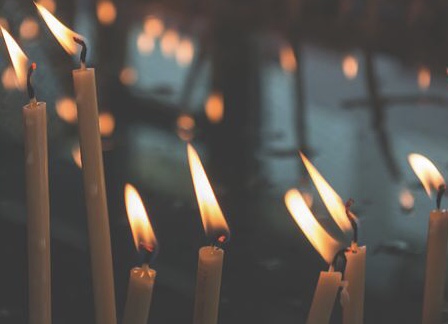And to the angel of the church in Sardis write: These things saith he that hath the seven Spirits of God, and the seven stars: I know thy works, that thou hast a name that thou livest, and thou are dead. Be thou watchful, and establish the things that remain, which were ready to die: for I have found no works of thine perfected before my God. Remember therefore how thou has received and didst hear; and keep it, and repent. If therefore thou shalt not watch, I will come as a thief, and thou shalt not know what hour I will come upon thee. But thou hast a few names in Sardis that did not defile their garments: and they shall walk with me in white; for they are worthy. He that overcometh shall thus be arrayed in white garments; and I will in no wise blot his name out of the book of life, and I will confess his name before my Father, and before his angels. He that hath an ear, let him hear what the Spirit saith to the churches. Revelation 3:1–6
Read More Than Conquerors, pp. 90-92
A. THE ADDRESS, verse 1 a
And so we come to Sardis, about forty miles south-cast of Thyatira. Twice its acropolis had been scaled and the city taken. Those who should have guarded it had slumbered instead. Their last thought before falling asleep had been, “Sardis is impregnable.” There had also been an earthquake—again totally unexpected! Ever since that day the city had never recovered, though, strange to say, the inhabitants had retained their smug complacency, as if no evil could ever befall Sardis.
B. CHRIST’S SELF-DESIGNATION, verse 1b
SardiS was spiritually dead; hence, needed the life· giving Spirit operating through the ministry of the Word. Cf. Revelation 1:4, 16, 20.
C. THE DENUNCIATION AND EXHORTATION, verses lc-3a
The citizens of Sardis and the members of its church were alike in one respect: they were cursed with the sense of false security: “Thou hast a name that thou livest, but thou art dead.” The citizens thought that their city was safe. The church-members thought that their church was alive. But the city was not really secure against human enemies and physical catastrophics; and the church was not really secure against Satan and his agents.
What this dead church must do, therefore, is become fully awake. It must establish whatever of value is still remaining. It must recall its early history—how it had received the Lord when the gospel had been first proclaimed to it—and must look unto the rock whence it had been hewn (see Is. 51:1).
D. WARNING AND THREAT, verse 3b
If Sardis’ church-membership fails to do this, its destruction will be as swift, sodden, and unexpected as had been that of their city.
E. PROMISE, verses 4, 5
Not everyone in this church was spiritually dead. There were exceptions, just a few names. These courageous exceptions were known by name to the Father in heaven. These few who had kept their garment of grace unspotted here would by and by wear the white garment of glory. White indicates holiness, festivity, victory. When earthly citizens die. their names are erased from the records. The names of these spiritual conquerors will never be blotted out. Christ himself would acknowledge them as his very own. He would do this before the Father and before his angels. Cf. Matthew 10:32; Luke 12:8, 9. Not only is it a great privilege to be walking in heaven arrayed in white, but especially is this an honor, namely, that such victors will walk with Christ (note the words “with me” in verse 4) in white, that is, in the closest possible fellowship with Christ, and that forever and ever.
F. CLOSING EXHORTATION, verse 6
This has been discussed previously.

Questions
1. In connection with verse 1, why not just “the Spirit of God” instead of “the seven Spirits of God”?
2. Verse 2: “Establish the things that remain.” Does this mean that a live member must never separate himself from a dead church?
3. Verse 3: “Remember how thou hast received,” etc. Is the study of the history of your church or denomination important? If so, why?
4. Smyrna-Pergamum-Thyatira-Sardis. Do you see any trend here? What trend? Anything comparable to it today? Can we do anything about it?
5. Is everybody’s name in the book of life?
6. Is there any connection between Matthew 10:32 and Revelation 3:5, last part of that verse?
7. And is there any connection between Revelation 3:3, “I will come as a thief” and Matthew 25:1–13? What is the important practical lesson?
